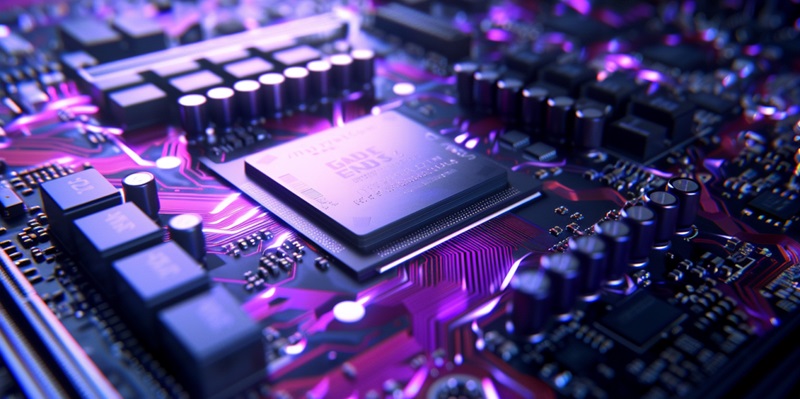With the imminent release of AMD’s Zen 5-based Ryzen 9000 desktop processors, enthusiasts and industry analysts are keenly observing how these new CPUs fare against Intel’s offerings. Scheduled for availability on July 31, the latest AMD units, including the Ryzen 9 9950X, Ryzen 9 9900X, Ryzen 7 9700X, and Ryzen 5 9600X, bring a suite of anticipated performance enhancements. The Zen 5 architecture promises to reinforce AMD’s competitive edge in both productivity and gaming scenarios. Notably, these improvements are not just incremental; detailed benchmarks suggest a significant leap in performance compared to both Intel’s latest lineup and AMD’s previous Ryzen generations.
Performance Benchmarks: AMD vs Intel
When examining performance benchmarks, AMD appears to have delivered impressive results, especially with its Ryzen 9 9900X. This processor is heralded as being up to 41% faster in productivity tasks alongside a 22% improvement in gaming performance relative to the Intel Core i9-14900K. These figures underscore AMD’s dedication to advancing processing power. It’s not just the top-tier chips; even the mid-range Ryzen 7 9700X shows considerable gains. Compared to the Intel Core i7-14700K, the 9700X is reported to be 4% to 42% faster in various productivity measures and up to 31% faster in gaming. Such disparities are not trivially significant; they are indicative of AMD managing to optimize their architecture for multiple demanding applications.
Moving down the product line but still seeing notable performance, AMD’s Ryzen 5 9600X outpaces the Core i5-14600K by margins as wide as 94% in productivity tasks and 29% in gaming. These benchmarks reinforce the Ryzen 9000 series’ capabilities and suggest that users might experience transformative performance improvements across the board. The leap in performance is attributed primarily to the architectural changes in Zen 5 CPU cores, coupled with a node shrink from TSMC N6 to TSMC N4. This combination has enabled AMD to deliver up to 22% more performance at the same thermal design power (TDP) compared to their previous generations.
Architectural Advancements and Motherboard Compatibility
Integral to the Ryzen 9000 series’ performance is the Zen 5 architecture, notably due to the transition to TSMC’s N4 node. By making this shift, AMD has been able to refine power efficiency, thus achieving higher performance metrics within the same thermal envelope. This architectural makeover allows for a bolder step forward, giving AMD the ability to not only match but often surpass Intel’s latest processors. These advancements aren’t just on paper; real-world applications are likely to validate AMD’s claims in meaningful ways once consumer reviews start pouring in.
In tandem with these powerful processors, AMD is rolling out new motherboard chipsets, notably the high-end X870E and X870. These motherboards introduce forward-thinking features such as USB 4.0 ports and support for PCIe Gen 5 standards, applicable to both GPUs and SSDs. This makes them a solid foundation for building high-performance rigs capable of meeting future technological demands. Moreover, the lower-end B850 and B840 chipsets introduce USB 3.2 Gen 2 and PCIe Gen 4 capabilities, bringing advanced features across various budget tiers. Memory compatibility also takes a leap forward, as the new motherboards support faster memory speeds, with Ryzen 9000 series CPUs capable of leveraging DDR5 8000 MT/s RAM, while maintaining a minimum specification of DDR5 5600.
Market Impact and Future Speculations
With the imminent release of AMD’s Zen 5-based Ryzen 9000 desktop processors, all eyes are on how these new CPUs will stack up against Intel’s offerings. The highly anticipated models, including the Ryzen 9 9950X, Ryzen 9 9900X, Ryzen 7 9700X, and Ryzen 5 9600X, are slated to hit the market on July 31. These processors are expected to deliver notable performance enhancements that could solidify AMD’s dominance in both productivity and gaming. The Zen 5 architecture is designed to offer substantial improvements, not merely incremental upgrades. Detailed benchmarks indicate a significant leap in performance compared to Intel’s latest CPUs as well as AMD’s previous generations of Ryzen processors. This has stirred excitement among enthusiasts and industry analysts, who are keen to see real-world applications and how these processors perform under varying conditions. The anticipation surrounding the Ryzen 9000 series suggests that AMD might once again disrupt the CPU market, setting new standards for performance and efficiency.

